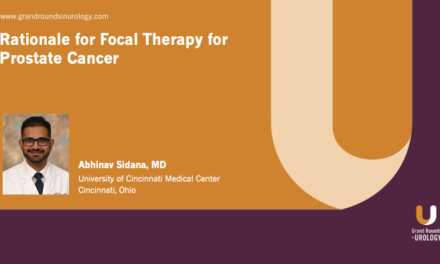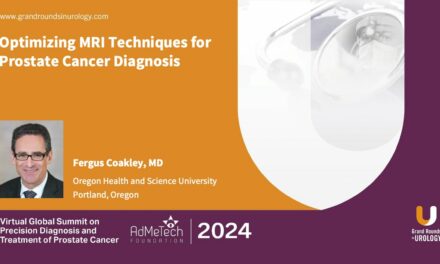Mark Emberton, MD, FRCS, presented “Cancer Control in 1379 Men Undergoing HIFU: A Multi-institute 15-year Experience” for the Grand Rounds in Urology audience in April 2022.
How to cite: Emberton, Mark. “Cancer Control in 1379 Men Undergoing HIFU: A Multi-institute 15-year Experience.” April 2022. Accessed Jul 2025. https://grandroundsinurology.com/cancer-control-in-1379-men-undergoing-hifu-a-multi-institute-15-year-experience/
Cancer Control in 1379 Men Undergoing HIFU: A Multi-institute 15-year Experience
Mark Emberton, MD, FRCS, Professor of Interventional Oncology at University College London, summarizes the design and findings of a 15-year multi-institute study of high-intensity focused ultrasound (HIFU) in patients with nonmetastatic prostate cancer. After an introduction from E. David Crawford, MD, Professor of Urology at the University of California, San Diego, and Editor-in-Chief of Grand Rounds in Urology, Dr. Emberton notes that the results of this 15-year study resulted in a wave of positive press about HIFU in popular outlets, observing that this widespread enthusiasm is due not just to HIFU’s efficacy, but its safety and adverse event profile as well. He then details the design of the study, beginning with the patient profile. Noting that outcomes in prostate cancer treatment are largely dependent on the risk profile of the patient, Dr. Emberton explains that in this study the average patient age was 66, ⅕ of patients had a PSA greater than 10, the average prostate volume was relatively low, the majority of patients were Gleason 3+4, and the majority of patients were T2. He mentions that intervention varied, and that while the majority of patients had quadrant ablation, about ⅓ had hemiablation. Dr. Emberton then considers the outcomes, observing that the “headline” of the study was the 83% 5-year failure-free survival for intermediate-risk disease. He also highlights that only 0.5% of patients experienced greater than 2 adverse events. Dr. Emberton discusses some supplementary data, emphasizing that if a clinician commits to HIFU, they also commit to retreating a subset of patients. He concludes that HIFU is very safe and that the data suggests that the majority of eligible patients with intermediate-risk disease can defer or avoid radical therapy with HIFU.
For more on this topic, visit our Next Generation High-Intensity Focused Ultrasound (HIFU) Learning Center.
ABOUT THE AUTHOR
Mark Emberton, MD, FRCS, is Professor of Interventional Oncology at the University College London. He is an Honorary Consultant Urologist at University College Hospitals NHS Foundation Trust and Founding Pioneer of The Charity Prostate Cancer UK. He was appointed Dean of UCL Faculty of Medical Sciences in 2015.
Professor Emberton’s clinical research is aimed at improving the diagnostic and risk stratification tools and treatment strategies for prostate cancer (PCa). He specializes in the implementation of new imaging techniques, nanotechnologies, bio-engineering materials and non-invasive treatment approaches, such as high intensity focused ultrasound and photo-dynamic therapy.
His research has been published in over 300 peer-reviewed scientific papers in journals including BMJ, Lancet Oncology and European Urology. He has also contributed to the development of guidelines for the management of PCa and lower urinary tract symptoms, published by the International Society of Geriatric Oncology and the European Association of Urology.
Professor Emberton is also involved in teaching within UCL and the London and South East Urological Training scheme. In addition to being a member of various urological and medical organisations (American Association of GenitoUrinary Surgeons, British Association of Urological Surgeons, European Association of Urology). He is a founding partner of London Urology Associates.




